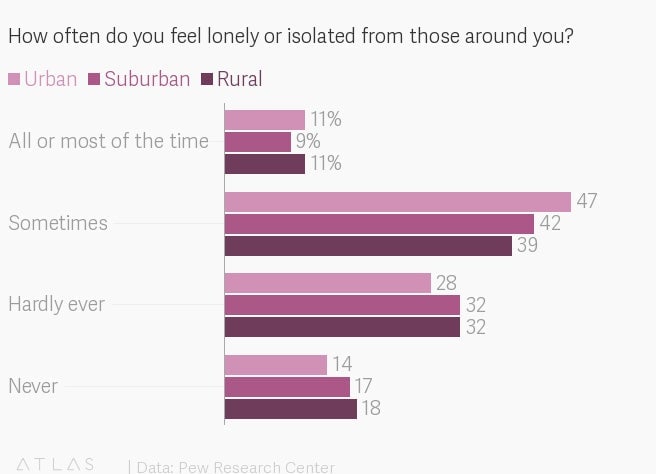Americans living in cities are not any more lonely and depressed than everyone else
City dwellers have a reputation for being hardened and unfriendly. At the opposite extreme is the utopian rural community, where everybody knows everybody else’s name and is willing to lend a cup of sugar. Stereotypes like this have contributed to the notion that there is a deep cultural divide between urban and rural areas, especially in the United States.


City dwellers have a reputation for being hardened and unfriendly. At the opposite extreme is the utopian rural community, where everybody knows everybody else’s name and is willing to lend a cup of sugar. Stereotypes like this have contributed to the notion that there is a deep cultural divide between urban and rural areas, especially in the United States.
Indeed, most Americans who live in urban communities think their rural compatriots do not share their values, and vice versa, according to a new survey from Pew Research Center. Yet the data also shows that Americans from these different places are more alike than popular opinion would have you believe. Urban life might actually be a bit warmer than people think, and rural life a little colder.
For one thing, people who live in urban areas don’t feel any busier than their rural counterparts.
City folk are more likely to “sometimes” feel lonely, but not by much.

Rural Americans are much more likely to know their neighbors…
…but people in cities talk to their neighbors as much as anyone else.
All groups are just about as likely to say they are satisfied with their relationships…
…and they all feel equally connected to their communities.
There are surely differences of opinion between urban, suburban, and rural Americans. The survey found the groups differ on how much they value diversity, their opinions of Donald Trump, and a host of additional major political issues. But as the data reveals, it’s not the case that there is something fundamentally different about the sense of community among each cohort. That should make urbanites feel better about moving to the country, and country folk heading to the city.